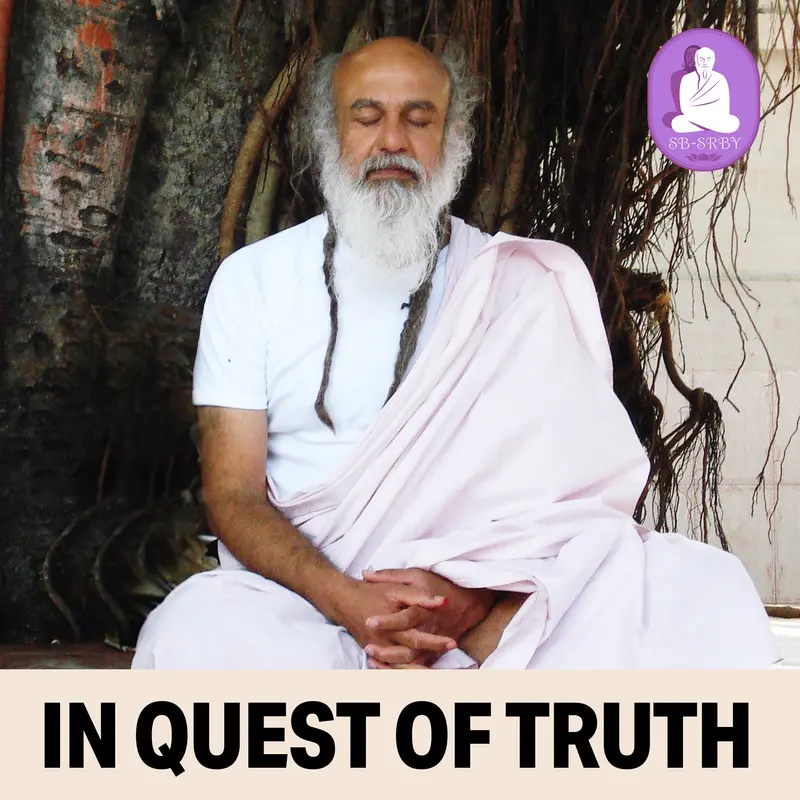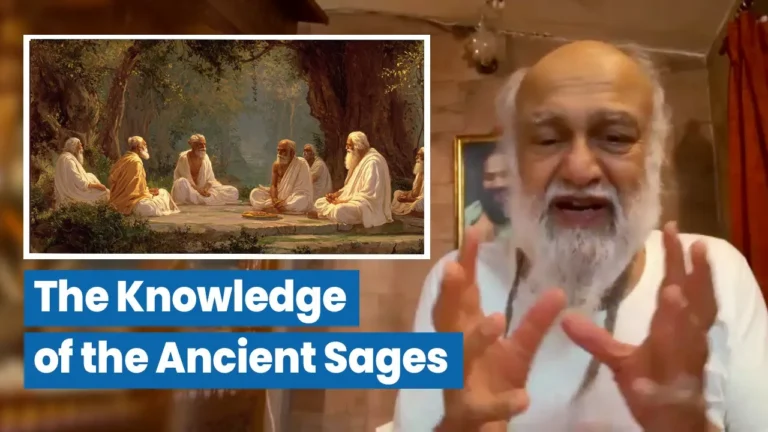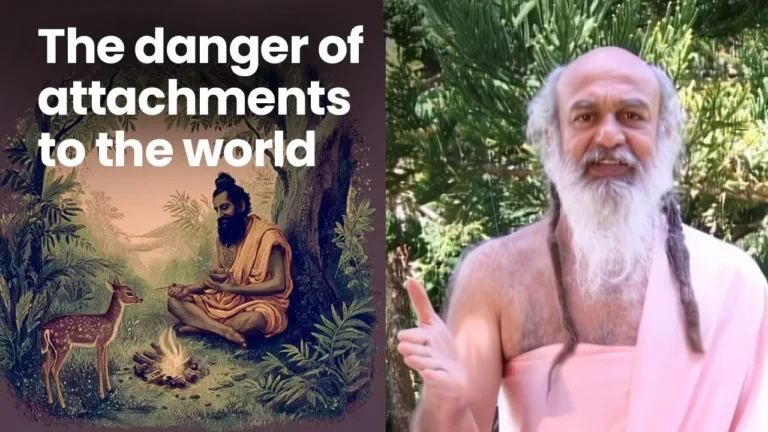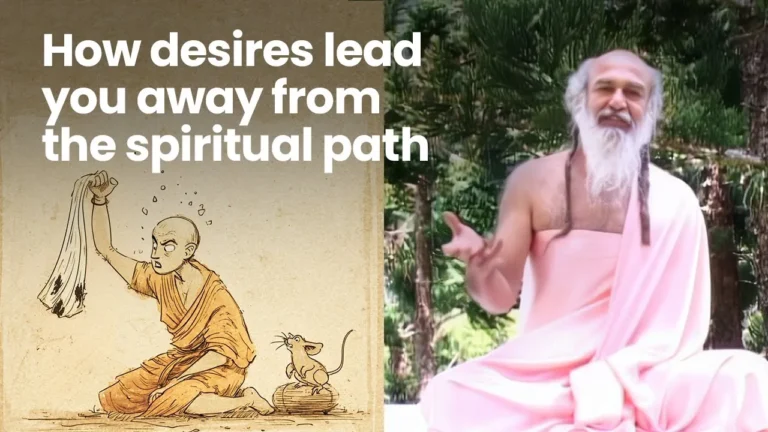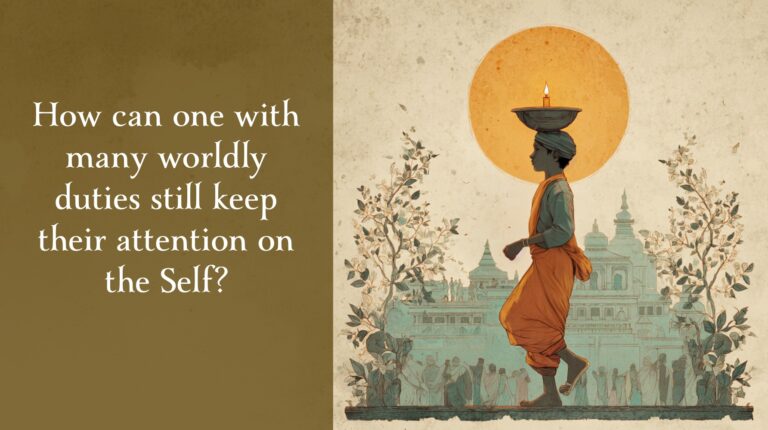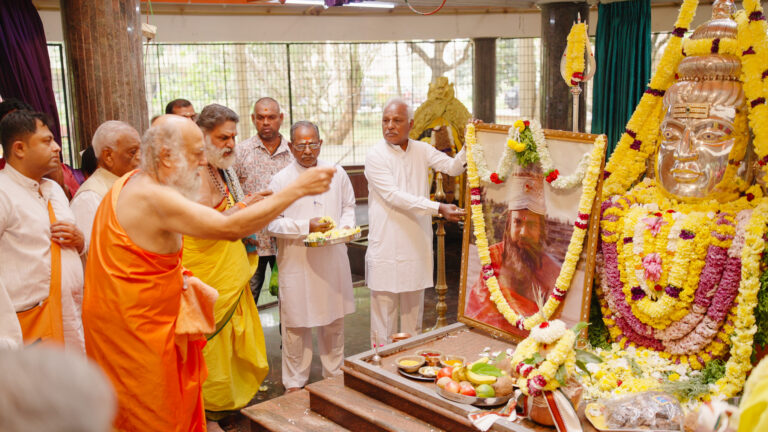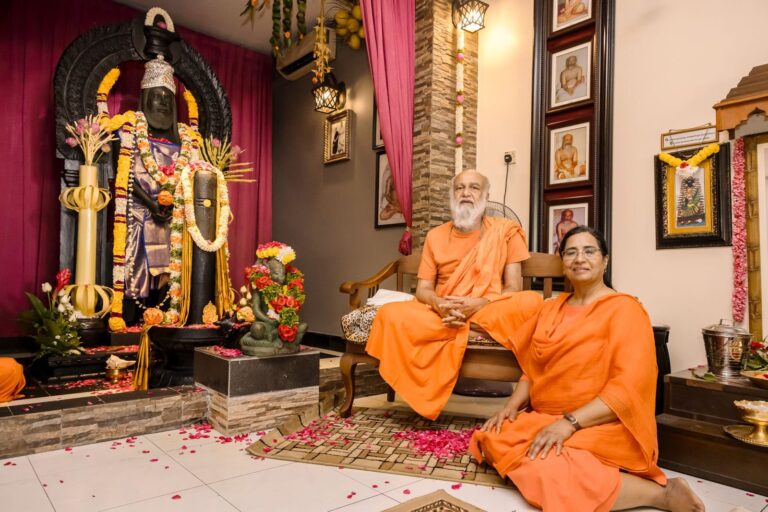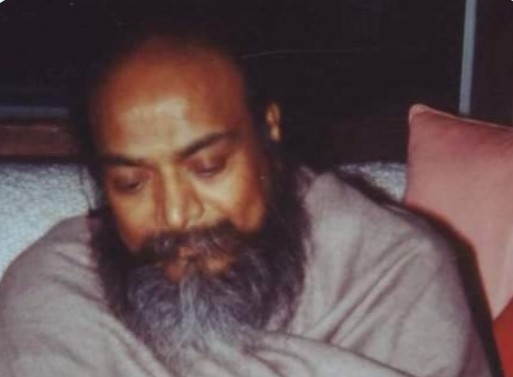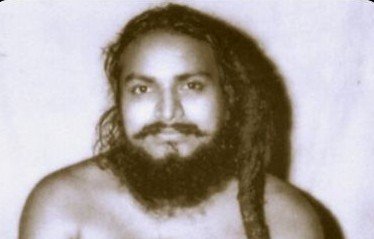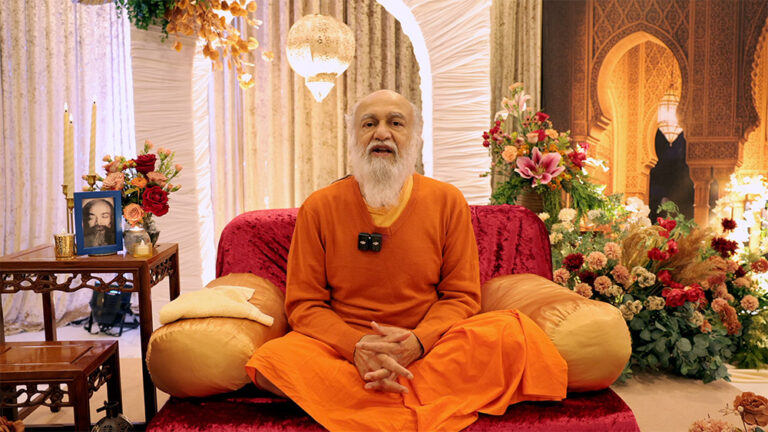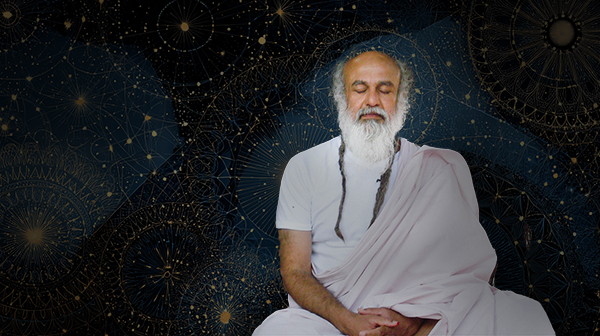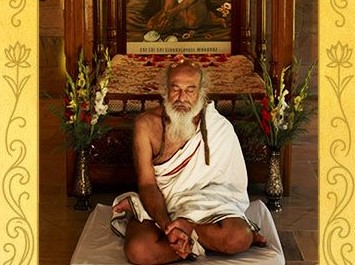Recorded on 29 July 2021 with participants from Malaysia
0:00 Introduction
0:23 What are the benefits of meditation and why is it not given utmost importance in society?
8:30 What are the things we should not do before and during meditation?
12:20 My mind keeps on wandering on other things in meditation, how to fix this?
13:55 What causes a headache in meditation?
15:16 How do we increase the meditative state more effectively?
18:02 Does watching the mind during daily activities improve meditation?
19:36 What is the state of samadhi?
21:12 What is the difference between complete meditative state and samadhi?
23:15 Is it true that people benefit from being around a person in samadhi?
25:01 What happens to the body when the mind is in samadhi?
26:35 Can one go into samadhi due to intense bhakti (devotion)?
28:34 How does the mind come out of samadhi?
Discourse: Thus Spake Babaji – online Q and A No. 53 – Meditation and Samadhi
Recorded: 29 July 2021 with Malaysian participants
Start of Questions and Answers
Question: Babaji the topic for today is meditation and samadhi. The first question Babaji. What are the benefits of meditation? And if meditation is one of the powerful exercises for spiritual growth, why is it not made mandatory or given the ultimate importance?
Babaji Maharaj: One thing, the benefits of meditation. Spiritually, we are much more than the birth and death of this physical body; our existence is in the infinite form of the soul. But just now, if the mind is unaware of that…it has to be aware. Take for example, any one of you take your names, if I call you in your name, you would be aware that it is your body’s personality that you have imagined, “Oh this personality is me. So, Babaji is calling me.” If I just call you “Hey atman, hey (transl.) come here” the people might get confused, they may not understand, “What is this old man calling, whom is he calling?” All are atmans. You have to be aware that you are that atman. So, this meditation is the gateway, beginning and the end, which will take you back to that. Because the meditation’s basic meaning is ‘your attention to.’ You have to pay attention. Just now you are unable to pay attention to your real existence, because it is preoccupied with its own imaginations. Just like I have told an example, your consciousness is preoccupied with the cinema that is running on the screen so you are unable to be aware that you are sitting there and you are watching the movie. To that extent the consciousness can get sucked into the illusory thoughts, visions, or make cinemas like that one. This world, imagine how powerful illusion this is. If on a small TV screen, if the movie or something that is running can suck your consciousness so, then imagine this entire universe. So that is what has happened. So we have to teach you to the return journey to become aware. Because you have forgotten about real Self, you are undergoing all happiness, unhappiness, fear, tension, pleasures and unpleasantness, all these things are happening. Everybody wants happiness; you ask anybody in the world. Nobody will want, “Oh let it be unhappiness.” It is a different thing like in Mahabharata, Kunti asked Krishna, “Give us all the troubles, so that we can remember You. When I remember You, we will always be happy.” So in the midst of troubles also, she wanted to be happy. That’s why she wanted those troubles. Because if there are troubles, we will remember God, we will remember Guru. That’s what it is said. So if we practice this meditation – first step is to erase all the imaginations and the acquired habits of the mind. That is why we asked you to just watch in-between eyebrows. Watching and thinking are different of the mind’s aspects. Mind is able to think and is able to watch. If it achieves hundred percent watching, then it stops thinking; it is unable to think. So that is what one needs to achieve first, ‘Just watch’ means. We repeatedly keep telling, “Do not analyze. If any thought comes just watch. If any vision comes just watch. Do not analyze.” Then it will be beneficial meditation. Then your mind will give up those thoughts habits, those visions habits, and it will become quiet. As it starts becoming quiet, it will start enjoying the happiness, that peace. “Constant craving of the mind is the basic reason for all unhappiness.” That’s what all great Masters have always told. Even Buddha, Bhagawan Buddha also has told, our Swamiji told all these things. So that is the first benefit of meditation. When one day you are able to achieve total silence of the mind. When the total silence of the mind happens, means only the consciousness of existence, a consciousness that you exist only remains, no other thought, no other definition, not even the ‘I’ or ‘who am I?’, or ‘what am I?’, nothing remains there. But you exist. You don’t disappear, you don’t become unconscious. That experience will take you to the Self. So that is the first benefit. This is combined with Supreme Peace and Happiness. That’s what everybody is looking for. So, that peace and happiness automatically descends, it comes there. So, worldly benefits also there, your mind becomes more stronger, your willpower, your focus, concentration power, your memory power, application of the brain, everything increases tremendously. So like this, all these are the benefits of the meditation.
So now you see, why people have not made it mandatory. I wish they had made it. If every teacher, every Master had taught only the meditation, “This is the final; this is what only can take you to the truth. You have to do. Even the God’s Grace can come only through this”, then perhaps everybody would have tried to meditate, and learn meditation at all. Different Gurus tried to teach different, different things, different, different terminologies, “You do like this.” They tried to simplify, they tried to make it a little more easy. The easier one tried to make – we human beings always are very lazy. We want to get it instantly without putting any effort. Like one hour meditation Swamiji insisted. We tried to make it half an hour. Somebody had written an email, “Is it okay, if I meditate only for fifteen minutes? I wrote, “Even if you don’t meditate also, it’s okay for me, but not okay for you.” So that’s what happens. That is why this has not been made mandatory. When every teacher doesn’t talk of the same thing then different students will take up different students. “My Guru has taught only to do bhajans, so I will do only bhajans. I am not going to do any meditation at all,” they say. So, that is what happens. That is the reason it is not been said as mandatory. But whatever you do, you repeat a name or a mantra or you try to do bhajans, you try to do anything, you listen to a lecture, your mind’s application, dhyana is important. Dhyana has to happen. Meditation has to happen. Like when I’m talking, if all the fifty-nine participants you are all sitting, if every one of your mind is here, applied here, then you will be aware of what the truth I am talking, otherwise, if your mind has run somewhere else… So that is the reason.
Question: Thank You Babaji. The second question is what are the things we should not do before and during meditation?
Babaji Maharaj: One thing is you should have taken sufficient rest when you sit for meditation so that you don’t feel sleepy or tired, all these things. And also after taking a meal you should give sufficient time to get it digested properly. Then again you should not feel sleepy or tired. Don’t eat very heavily at one time. Try to split it as into smaller meals, three times four times, little, little. Whenever you feel hungry eat little so that you can meditate well. So these few things are very important. And then when you sit, relax. Let the world be aside. We don’t have to carry the entire universe on our heads. We just have to bother our minds, to clean up that one. So relax. Relaxing and in a gentle way; don’t be harsh to yourself. Gentle, be gentle. That’s why our Swamiji, our Guru was so unique. He prescribed, “You can sit in any comfortable posture. There is no prescription you have to sit like this only. If you cannot sit, you cannot meditate.” What Swamiji thought, “There shall not be any excuse that you don’t meditate. You just meditate. You cannot sit in a particular posture, any other posture, you can sit on a chair, meditate. You close the eyes. That is simple.” So, like that He taught. So these are the things. Then follow the four-point instructions. Remember like a command. It is coming from your commander. Don’t take it lightly that an old man is simply repeating, “Sit down, close the eye, do this, that.” It is the commander who is giving. Otherwise you will be shot dead if you don’t do that one. You think seriously, then you will become definitely serious.
Close your eyes gently. That you do first. Don’t keep watching here and there. Gently close, and just immediately start watching the front portion, here in between eyebrows. Fix your eyeballs there, and just watch. Any thought comes, you just watch Any vision comes, you just watch. So that is what you have to do. During that you don’t have to repeat any mantra. Don’t repeat means don’t repeat. It’s an order. And then don’t imagine – third point. Don’t imagine any thought appears, mind has a tendency to imagine “Why this thought is bad, why is this coming, who made this to come?” No need, Ad ella theve ille – don’t bother. Just ignore and watch. Then that that will disappear. That thought will disappear. So do not imagine – it’s an order, right? And do not open your eyes. Gradually, we have to make you sit for one hour. So far we have been bit lenient and sweet and soft to you all making you to sit only for thirty minutes. Very soon we will plan to do it for one hour of meditation. Remember, I’m not going to spare anyone of you. I am the commander. I am your Master. I am your Mother. I’m your Father. So these are the things you have to do and don’t do.
Question: Thank you, Babaji. The next question. Babaji I can’t focus. My mind keeps on wandering on other things. How do I fix this Babaji?
Babaji Maharaj: Just think that with a cane your Master is just standing behind you; any moment He can hit you on your head, then you will start watching. That seriousness has to come. By practice. You know for long time immemorial, by practice mind has gone out of control. Slowly, slowly you practice in a gentle way. Master has asked me to watch means, let me watch, that is all. Like Swamiji said, remember He used to say, a couple of times He told me, “When the Jangama Sage appeared He just touched me and told me, “Gently close your eyes, concentrate your mind and sight in between eyebrows and just keep watching there. And do not repeat anything. Don’t imagine anything. Don’t open your eyes.” Swamiji said ,“I just did it.” Instantly He did it. He never questioned anything. See the obedience of a student to His Master? Our Swamiji’s obedience to Jangama Sage, Lord Shiva. So that’s why He could get into tapas. If only any one of us follow, so anybody can get into tapas. So remember the instructions; “These are the instructions of the Master. I cannot afford to think anything else. I cannot afford to allow the mind to run away. I have to just watch.”
Question: Babaji, during meditation why do we have headache when we try to focus in between the eyebrows?
Babaji Maharaj: Just again remember these points. When I say, “Gently close,” means gentle, be gentle. Don’t be in a rush – ee en edo katti pidicho kudichi madri [Tamil transl: holding onto something very tight so that it causes pain).] You don’t have to do all such things. That’s what creates headaches. If you gently see the front portion… In-between eyebrows I tell, but even if it is front portion, don’t worry for a while, in the beginning. In due course of time, it will come into in-between eyebrows. If you gently watch, paditu tungru podu taleyavaku? Majava nalla tungru illiya. Aday madri, [transl: When you lie down to sleep and place your head you have an enjoyable sleep don’t you? In the same way,] gently close your eyes and watch. Then there won’t be any headache. When you try to rush and when you become irritated and you feel like banging your head on to the wall if it is not coming, if all thoughts are coming, running. Ad ella theive ille [transl: That doesn’t matter.]. Gentle a chumma patininge ira, poru [transl: Gently, just quietly keep watching, that is enough.]. You just keep watching in-between eyebrows. Apdi panna [transl: If you do like that] headache won’t come, it will not come, it should not come at all.
Question: Thank You Babaji. The next question. Babaji, You have mentioned before that during meditation, we are often trying to meditate, trying to withdraw from thinking and only some amount of time will be in total meditative state. How do we increase the meditative state more effectively?
Babaji Maharaj: The more that you are able to keep quiet mentally. There is one suggestion at this point. Occasionally or every day or once in a week for at least one hour or two to three of hours, little bit if you get time, try to observe mounam [silence]. Quietly sit in one place in a room, don’t meet anyone, don’t talk to anyone, don’t think about anything. Silently sit, practice like that. Then slowly your mind also will practice to become quiet. So, if you have become… In the society we all become very talkative, keep talking, talking, talking, talking, we are to do all the things – Cutta Cutta Cutta Cutta Cutta Cutta ana anni [transl: Jabbering on and on] hours together and the practice troubles us in meditation also. The mind becomes a chatterbox. So practice gently like that one, keep watching. Like that, if even every day also if you can take out say one hour time if you are unable to sit and meditate, but you have to sit alone and just sit down, see that you don’t become mad when you sit alone. Quietly, pleasantly think about God. Think about the atman, think about the Guru; all the good things, think about those things, forcibly. Then you will practice. It is practice only ‘abhyasey tho Kaunteya’ [(from the Bhagavad Gita) Lord Krishna to Arjuna: Practice O Son of Kunti]. To Arjuna Krishna said when by ‘abhyasa balam pallakam’, that is the habits of the mind. So like that if you practice. And everyday sit for meditation, not that one day Babaji comes online, we will sit and afterwards podaa, every day yaarda ookaramudheyu. Avvar ennamo shonnar namma mudhiyama? [Tamil transl: O let it go, who can sit every day? Just because He said is it possible for us?] No, every day sit. First to sit half an hour – half an hour meditation, then half an hour silent. Don’t talk to anyone, don’t allow anybody to talk to you. Silent! Ella navitti kitte edado kovil o kotadmu iringa ange poi chumma ookarango. Illey vitti muridingju enna won roomle ore artale ookarango. [Tamil transl: If there is a temple or such place near your house, go there and sit quietly. Otherwise if possible, sit in a corner of a room in your house.] These things will be very beneficial for meditation. Eventually you will achieve one day the silence of the mind.
Same questioner: Thank You Babaji. The next question. Does watching or observing the mind during the day-to-day activities help improve meditation?
Babaji Maharaj: That will also definitely help, what sort of thoughts coming to your mind, and then you slowly a little bit pull up yourselves. “Heh, this is a wrong thought. Why should I entertain this? Every thought can be an obstacle. So, I don’t have to be thinking like this.” So, any other activities necessary, you just think and work, just think and work. Don’t keep simply thinking, it is like that. So, if you practice like that one, unwanted thoughts will not disturb you. You have to practice during the day, daytime activity also. Watch yourself – what type of thinking is coming, any wrong thought coming. Like if we have a child, if it starts doing something naughty, wrong thing, immediately we want to correct that one. “Hey don’t do this one “anda madri anga chesthe pannadhe.” Chinna amma, appa ella tithuva [Tamil transl: “Do not do mischief like that.” While small, mother and father used to scold]. So like that, your mind is your baby. Look after that. Any smallest wrong thought coming, immediately pull that, “Hey no, no, this is not the thing. I must not be thinking like that. Let me think about my Guru. Let me think what I have to do next now, and let me get into that job.” Keep yourself busy also. So, these things will be very helpful.
Question: Thank You Babaji. The next question Babaji is on samadhi. Can Babaji please explain what is the state of samadhi?
Babaji Maharaj: You see, when you… it’s quite difficult to give a particular definition of what it is. Samadhi means the mind which is wavering, spinning, going into a total stillness, quietness. That is the basic understanding of samadhi. So that’s what you have to achieve. Then when samadhi happens, you are not aware of anything, not about the body, not the surroundings, not even the ‘I’ thought is there – like that it happens. So, one day when you achieve – dream to achieve this thing in this very life. This human life is the rarest of rare opportunity, that is the highest achievement one can do. Then you become aware of your real Self. That is what is known as samadhi, total stillness. Not just you sit, close your eyes, “iyo ivar samadhi le irkar.” apri ille. Ulle manase chumma avanu. Quietaa samadhi, [Tamil transl: “Oh, he is in samadhi.” Not like that. Inside the mind must be quiet. Quietly samadhi,], stillness. Total, onname alochana vara, aame [Tamil transl: No thought should come, yes.]. Nothing should come. So, that day – one day it will come. That is samadhi.
Question: Babaji, what is the difference between being in complete meditative state and being in samadhi?
Babaji Maharaj: Complete meditative state when your mind is totally quiet once for all. That is the samadhi. It is all the same. When you are able to totally meditatively at all times; you practice so much, so long. Like even if I’m talking, I’ll just tell for example, even if I am gossiping or you are gossiping to me, you make me, force me to listen to you, and I try to talk to you, my mind is totally quiet and silent. It doesn’t picturize, it doesn’t… anything that is happening, outside world, it doesn’t reverberate in the mind. Mind doesn’t spin or jump, it is still, quiet, totally ever silent one. So, that is the real meditative. It is always in the awareness of the Self. Always meditative means not that as a separate entity you will be meditating on something. You have become one with that one. Now you are aware of only that existence and nothing else. That is the meditative. Your attention is tavamasyadhi lakhsam. Anda shloka dal shollarene, Brahmanandam Paramasukhadam [transl: As mentioned in the verse Brahmanandam Paramasukhadam]. Brahmanandam – you cannot even imagine such an amazing peace and happiness, is there. Paramasukhadam – Supreme Happiness. And such a yogi’s attention is always on that Tatva, on the Ultimate Truth. In ancient times, the sages called the Divinity or Ultimate Truth as Tatva, means ‘That’. I am That. So, ‘That’. So, the awareness is always on That, quiet. Tatvamasyadhi lakhsnam. Lakhsnam enna [Tamil transl: Lakhsnam means] aim, attention is on that Tatva.
Question: Thank You Babaji. Babaji, is it true that when the person is in samadhi state, the people around the person and the environment will benefit from it?
Babaji Maharaj: Ah, you are very greedy and lazy. You just want to go near a person who is in samadhi and want to get benefited. Really, it doesn’t happen like that. These are all myths. Some vibrations will be there. You might feel some vibrations, a thrill, inspiration. Like you when you sit with us, you might feel that inspiration, that thrill or some vibrations, but you have to meditate. Don’t simply think that when you go near a person who is in samadhi you will also go to samadhi or you will get self-realized. Don’t have such a wrong notion. I want to tell the truth. I’m talking the truth today. Many masters may not talk the truth, but our Swamiji always spoke the truth. He trained us to talk the truth. You have to do meditation, no escape. Anywhere you go, you do anything, any 100,000 times you prostrate – these will all benefit when you have a reverence to the Guru. What the benefit is you will feel inspired to do it yourself. Just like many people they express on the email, “Whenever You are online Babaji, the meditation comes so beautiful. The day You are unable to come online it’s very difficult.” So, like that an inspiration you will get, some vibrations you will get, but you have to do meditation also.
Question: Babaji, when the mind is in samadhi, what happens to the body?
Babaji Maharaj: Nothing happens to the body. You know, by practice when a person is practicing tapas, slowly and smoothly the respiration of inhale and exhale smoothly keeps happening little bit, because at all times oxygen must be going inside the cavity and it must reach the brain, otherwise the body dies. That’s why in ancient times a certain period has been given, only to a certain period it can be. Otherwise, one has to come out in twenty-four hours and have a little bit of food that he can digest so that it can give oxygen also, and the food also has to become blood. So, body has to be looked after according to the rule. By doing this also, one can practice samadhi, is possible. When one is in samadhi, such a person may not have consciousness of the body or surrounding. And at that time, other loyal disciples, devotional devotees need to be there to attend, otherwise sometimes the body can get harmed if one is practicing like that, without any assistance. This is my personal opinion.
Question: Thank You Babaji. Can one go into samadhi due to intense bhakti, for example, in bhajans or prayers?
Babaji Maharaj: It is only bhaava samadhi can happen. Because during bhajans, bhaava gets created, or your mind’s feelings can become inspired and totally single-pointed, but the bhakti is on a particular form of the Divinity. So then the mind can temporarily go into a single pointedness which is known as a bhaava samadhi. So, it gets connected to the Divine or to the Divine Guru very well – these things happen. But for a total samadhi practice, silent practice is essential. No sound or sight. These two both needs to be rejected. That’s what we tell that this meditation method which our Swami taught as is the highest methods practiced in ancient India known as Rigvedic era, where you are trying to give the mind to become silent on its own. Like that, eventually one day when you achieve total silence – total silence – no sound and no sight, because the entire creation has happened based on the sound and sight. The rest of all the paths are based on these things. If you are unable to keep the mind quiet, at least you try to focus on some form of the God, some name of the God, in the name of some music. Again, music can be a very good therapy for mind control and going into bhaava samadhi. But to go into samadhi it is the dhyana, silent meditation. Learn to keep your mind silent, then it goes to samadhi.
Question: Thank you, Babaji. The last question for today. How does the mind come out of the state of Samadhi once it has gone into it?
Babaji Maharaj: One is the Divine’s ordainment – the Divine will bring you out. Another practice our Swamiji, our Guru taught us – He used to say, “Just keep a glass of water before going into the deeper meditation and samadhi. At least once you think ‘I have to have this glass of water’, then go. Then the deep samadhi comes. Then after some time, in due course of time, some hours later, so that thought will bring you out to have the glass of water.” But this thought will not be an obstacle because you will not be entertaining it as a reality. Just imagine, “I need to drink the water,” and then you forget about it. You won’t be worrying, “I have to have the water, I have to have the water,” then you cannot go to samadhi at all. A tapaswin goes into samadhi, so then that brings him out, and then a small sip of water is taken. So this is how we were taught by Swamiji.
End of Session

